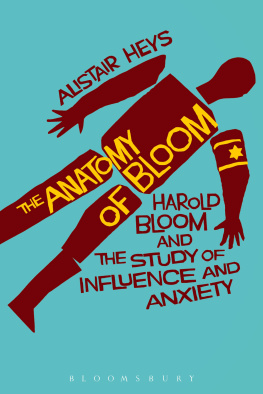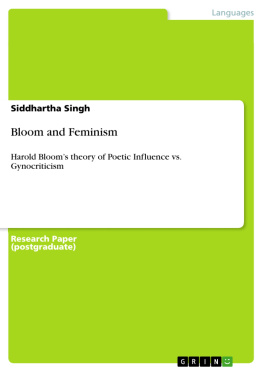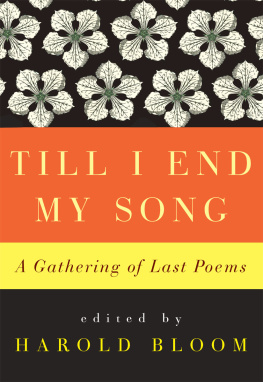The Anatomy of Bloom
The Anatomy of Bloom
Harold Bloom and the Study of Influence and Anxiety
Alistair Heys

Bloomsbury Academic
An imprint of Bloomsbury Publishing Inc
| 1385 Broadway | 50 Bedford Square |
| New York | London |
| NY 10018 | WC1B 3DP |
| USA | UK |
www.bloomsbury.com
Bloomsbury is a registered trade mark of Bloomsbury Publishing Plc
First published 2014
Alistair Heys, 2014
All rights reserved. No part of this publication may be reproduced or transmitted in any form or by any means, electronic or mechanical, including photocopying, recording, or any information storage or retrieval system, without prior permission in writing from the publishers.
No responsibility for loss caused to any individual or organization acting on or refraining from action as a result of the material in this publication can be accepted by Bloomsbury or the author.
Library of Congress Cataloging-in-Publication Data
A catalog record for this book is available from the Library of Congress.
ePub ISBN: 978-1-4411-7763-6
Typeset by Deanta Global Publishing Services, Chennai, India
For Lauren
Contents
I would like to thank Harold Bloom for granting me permission to quote from his books. I should also like to thank Stephen Jones for allowing me to pursue my research at the Beinecke Library. A big thank you must also go out to James Prosek, Fred Burwick, and Jim McKusick. I cannot thank Vitana Kostadinova and Vadim Banev enough; a more circumspect thank you is directed to Jonathan Bate. I thank my parents for their support, while many thanks should be expressed toward Alan Rawes, Philip Shaw, Bernard Beatty, Jonathan Shears, Emily Bernhardt Jackson, and Michael ONeill. Rebecca Ferguson, Lyudmilla Kostova, and Marilyn Gaull are most worthy of commendations, as is Agatha Bielik-Robson. Haaris Naqvi, James Tupper, and Grishma Fredric deserve the biggest thanks of all.
What do you want to know now? asks the doorkeeper, you are insatiable. Everyone strives to attain the Law, answers the man, how does it come about, then, that in all these years no one has come seeking admittance but me? The doorkeeper perceives that the man is at the end of his strength and that his hearing is failing, so he bellows in his ear: No one but you could gain admittance through this door, since this door was intended only for you. I am now going to shut it.
Franz Kafka
Then one day I reached those city gates where angels are servants, where planets and stars are slaves, a garden of roses and pines girded round with walls of emerald and jasper trees, set in a desert of gold embroidered silk, its springs sweet as honey, the river of paradise: a city which only virtue can aspire to reach, a city whose cypresses are like the sabres of intellect, a city whose sages wear brocaded robes of woven silk. And here before these gates my reason spoke: here within these walls, find what you seek and do not leave without it. So I approached the guardian of the gate, and told him of my search. Rejoice, he answered, your mine has produced a jewel, for beneath this land of Truth there flows a crystal ocean of precious pearls and pure clear water. This is the lofty sphere of exalted stars; aye it is paradise itself, the abode of houris .
Nasir Khusraw
William Bradford describes the Pilgrim Fathers as quieted spirits; his Of Plymouth Plantation lies at the beginning of American history. The quietude of the Pilgrims figures an instant of repose, when the power and grandeur of their Atlantic crossing, if you will, their shooting of the gulf, their darting of an aim, had been accomplished. This quietus constitutes a provocative place to start my book because it reminds of the very passage that first inspired Harold Bloom to play Plotinus to Ralph Waldo Emersons Plato. The Emersonian clinamen away from Europe represents the origin of a significant portion of Blooms rhetoric but I wish to suggest that the latters belief that Emerson founds an American religion adumbrates the limit of Blooms opacity, the flaw in his gem of transparency. To comprehend why requires a short introductory examination of Blooms treatment of Walt Whitman and Herman Melville, in order to demonstrate the importance of the figure of iconoclasm in his work. Therefore, I want to contrast Bradfords pacific
Martyn records that the settlers would not let I would wait upon I dare not, a phrase that has unexpectedly pacifistic connotations. I write this because a most truculent passivity is to be found in the aftermath of the English Revolution and in chiasmus that saw George Fox swap the Lions war of Cromwell for the Lambs war of meekness. Stephen Marx outlines that, while the founding father of the Quaker movement began a covenant of peace, he advocated speaking truth to power: In 1654 Fox wrote to Cromwell, My weapons are not carnal but spiritual and my kingdom is not of this world, therefore with a carnal weapon I do not fight.
Colliers perspicuous insights into Quaker religious practice open casements on the dawning American poetry of Walt Whitman and in particular, As I Ebbd with the Ocean of Life. Whitman was a Hicksite Quaker and we find the figure of silence in arguably the most mysterious passage of spontaneous Quaker confession in his poetry:
O baffled, balkd, bent to the very earth,
Oppressd with myself that I have dared to open my mouth,
Aware now that amid all that blab whose echoes recoil upon me I
have not once had the least idea who or what I am,
But that before all my arrogant poems the real Me stands yet
untouchd, untold, altogether unreachd,
Withdrawn far, mocking me with mock-congratulatory signs and bows,
With peals of distant ironical laughter at every word I have written,
Pointing in silence to these songs, and then to the sand beneath.
Whitmans arrogant poems are idolatrous creations and the real Me disparages them as a form of selfishness, castigating them as Held by this electric self out of the pride of which I utter poems. Leviathan is the king of all the children of pride and Whitman, though more meek than Ahab, is nonetheless stung by nature, and all the blab of outward observances that quarrel with inner light. Whitman has dared to utter poems and the outside worlds echoing recoil opposes what roughly equates to a far-withdrawn silence that baffles his displaced individualism that once heard the Word of the Lord but which now dares be lordly. The symbolism of the tide-smoothed shore would seem the greatest triumph of the poem, since it figures not only the never-to-be-touched untold richness that needs to be cleansed of the dross of outward earthly backwash, but also the clearing away of the influence of idolatrous Old England. Whitman is mothered by the Atlantic and falls upon the shore as if it were his father; the sands are teraqueous; Whitmans sexuality was just as ambiguous. There is more than a hint of self-disgust at Whitmans stand-up-to-speak autoeroticism in the phrase, See, from my dead lips the ooze exuding at last. But this image can usefully be compared with lines from Coppe:
No psalm shall be sung but the Lord our Song.
No Holiness,but the Lord our Holiness.
No righteousness,but the Lord our Righteousness.
Reprobate silver shall all other be called, as it is; yea, dung, dross, dogs meat
Menstrous rags,worse than the filth of a Jakes house.
Collier comments on the ambiguity between saying that all is pure sacredness and then that all is reprobate foulness; in contrast, Whitman loves too much what he should hate and more often preaches that what is good is perfect and what is bad is just as perfect. The same kind of listed flotsam and jetsam is to be found in Whitmans poem, albeit his inventory of tide-dumped odds and ends has a certain lascivious musicality:
Next page




